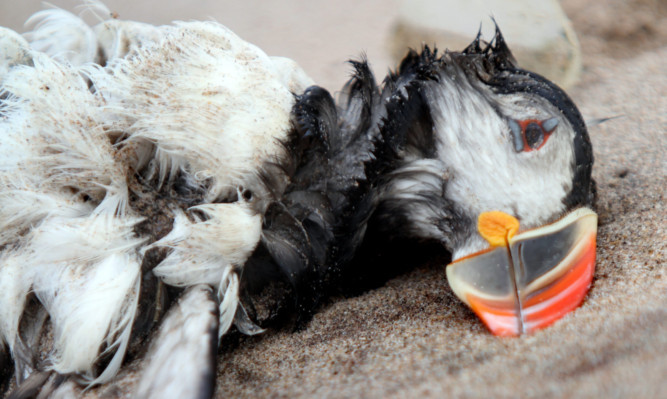More than 450 dead puffins have washed up along Scottish coastlines in the worst storm “wreck” for half a century.
RSPB Scotland confirmed the death toll and predicted thousands more are at risk if the high winds that have lashed the area continue.
Scores of puffins were found at Lunan Bay, near Montrose, and at St Cyrus and hundreds more have littered foreshores as far south as Northumberland.
Dead birds have also been found in the Carnoustie and Panbride area and to the north of Aberdeen.
Puffins traditionally feed at sea at this time of year and are expected to start arriving back at coastal colonies next month. However, it is feared they may either be drowning, succumbing to exhaustion or simply struggling to find enough food in difficult conditions.
A team from RSPB Scotland travelled to beaches in Angus and the Mearns yesterday to assess the scale of the carnage.
A spokeswoman said: “This may be the worst puffin ‘wreck’ we have seen for almost half a century. Despite their small stature puffins are fairly hardy birds, adept at coping with the harsh conditions of life at sea.
“To hear that so many have been discovered dead is unusual and worrying.
“We are in close contact with experts from the Centre for Ecology and Hydrology to learn more about what is happening but it appears that the prolonged and unprecedented weather is making life extremely difficult for this species.”
Razorbills and guillemots have also been found dead along the same stretches of beach.
The start of the breeding season is drawing near and tens of thousands of seabirds are due to return to the mainland to raise their young.
RSPB Scotland and other conservation groups will continue to monitor the fortunes of puffins and other species throughout the summer with the help of local volunteers.
Tom Brock from the Scottish Seabird Centre said extreme weather had “undoubtedly” contributed to the deaths.
He added: “Many seabirds, including puffins, have been suffering significant population falls in many parts of Scotland in recent years, and it is thought that this may be related to food shortages, which could be a result of climate change and changing sea temperatures.”
